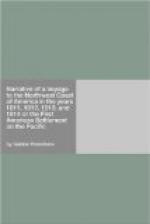On the 26th, a part of our people embarked in the three canoes which remained, and the others followed the banks of the river on foot. We saw in several places some veins of bituminous coal, on the banks between the surface of the water and that of the plain, say thirty feet below the latter; the veins had a dip of about 25 deg.. We tried some and found it to burn well. We halted in the evening near a small stream, where we constructed some rafts, to carry all our people.
On the 27th, I went forward in the little canoe of skins, with the two hunters. We soon killed an elk, which we skinned and suspended the hide, besmeared with blood, from the branch of a tree at the extremity of a point, in order that the people behind, as they came up, might perceive and take in the fruit of our chase. After fortifying ourselves with a little food, we continued to glide down, and encamped for the night near a thick wood where our hunters, from the tracks they observed, had hopes of encountering and capturing some bears. This hope was not realized.
On the 28th, a little after quitting camp, we killed a swan. While I was busy cooking it, the hunters having plunged into the wood, I heard a rifle-shot, which seemed to me to proceed from a direction opposite to that which they had taken. They returned very soon running, and were extremely surprised to learn that it was not I who had fired it. Nevertheless, the canoes and rafts having overtaken us, we continued to descend the river. Very soon we met a bark canoe, containing two men and a woman, who were ascending the river and bringing letters and some goods for the Rocky Mountains House. We learned from these letters addressed to Mr. Decoigne, several circumstances of the war, and among others the defeat of Captain Barclay on Lake Erie. We arrived that evening at Hunter’s Lodge, where we found four new birch-bark canoes. We got ready two of them, and resumed our journey down, on the 31st. Mr. Pillet set out before us with the hunters, at a very early hour. They killed an elk, which they left on a point, and which we took in. The country through which we passed that day is the most charming possible; the river is wide, handsome, and bordered with low outjutting points, covered with birch and poplar.
On the 1st of June, in the evening, we encamped at the confluence of the river Pembina. This stream comes from the south, and takes its rise in one of the spurs of the great chain of the Rocky mountains; ascending it for two days, and crossing a neck of land about seventy-five miles, one reaches Fort Augustus, a trading post on the Saskatchawine river. Messrs. M’Donald and M’Kenzie had taken this route, and had left for us half a sack of pemican in a cache, at the mouth of the river Pembina. After landing that evening, Mr. Stuart and I amused ourselves with angling, but took only five or six small fish.
On the 2d, we passed the confluence of Little Slave Lake river. At eight o’clock in the morning, we met a band or family of Indians, of the Knisteneaux tribe. They had just killed a buffalo, which we bought of them for a small brass-kettle. We could not have had a more seasonable rencontre, for our provisions were all consumed.




